
Summer 2006
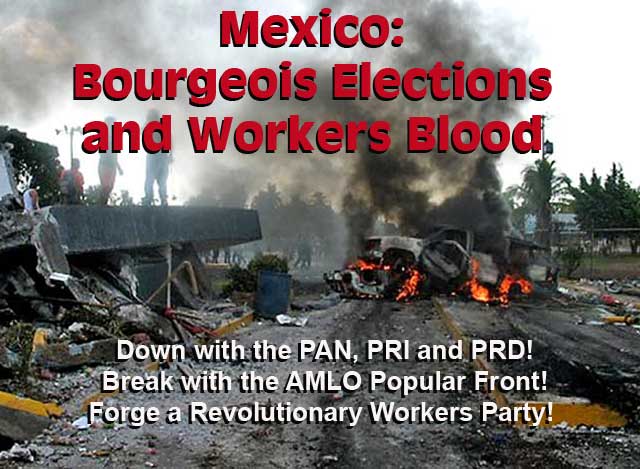
Police cars burn after striking workers retake Sicartsa steel plant in Lázaro Cárdenas, Michoacán, 20
April 2006. Federal, state and local authorities sent army of 1,000 police and marines to oust strikers
from plant they were occupying. Two workers were killed, shot in the head. (Photo: Eduardo Verdugo/AP)
Form Workers Defense Committees!
When Mexican voters went
to the polls on July 2, the
election campaign had only reached the half-way point. A month later,
the
outcome is still up in the air. Hundreds of thousands of supporters of
Andrés
Manuel López Obrador, the candidate of the bourgeois populist
Party of the
Democratic Revolution (PRD), have taken to the streets in the mass
“informational assemblies of July 8, 16 and 30 – with 500,000, 1
million and up
to 2 million protesters respectively – protesting crooked vote counting
and an
election process shot through with fraud. López Obrador, widely
known by his
initials AMLO, has camped out in Mexico City’s Constitution Plaza, the
Zócalo,
vowing to stay until every vote is recounted, “vote by vote, ballot box
by
ballot box.” Felipe Calderón, the candidate of the right-wing
National Action
Party (PAN), who according to federal election officials, had a
razor-thin lead
of half of one percent in the voting, is counting on the electoral
court and
the state machinery to impose his “victory.” The candidate of the
Institutional
Revolutionary Party (PRI), Roberto Madrazo, bombed out and his
long-ruling
party is unraveling amid internal feuding. Everything indicates that
this drama
will continue to play out for some time.
Was there fraud in the
recent Mexican elections? How
could there not be? Forget about the World Cup, Mexico is world
champion in
election fraud.1
Under the
long-ruling Institutional Revolutionary Party (PRI), which ran the
country as a
state party for seven decades, election fraud became an art, if not a
science.
This is the land of the carusel, with revolving-door voters who
go from
poll to poll casting votes for the governing party; of the casillas
embarazadas, the “pregnant ballot boxes” which arrive at the polls
already
stuffed with votes for the incumbent; of the mapache, the
raccoon, who
empties boxes of opposition ballots and replaces them with
pro-government
votes, or simply removes the ballot boxes altogether. Here is where in
the 2000
election, a PRI governor (in Yucatán) bragged about handing out
thousands of
washing machines to party loyalists and even took a photo of the
“presents”
lined up. And in 1988, this is where the ultra-modern computerized
voting
system suddenly “crashed” at 2 a.m. the night of the voting, and when
it came
up again the next day the lead had mysteriously switched from
challenger
Cuauhtémoc Cárdenas to the PRI machine candidate Carlos
Salinas de Gortari.
 Faud? Here? Marked
ballots found in the garbage of a district election office in Mexico
City
Faud? Here? Marked
ballots found in the garbage of a district election office in Mexico
City
(Photo: Carlos Cisneros/La Jornada)
Fraud in Mexico is not an
aberration but an integral
part of the electoral process. And not just in Mexico. In
the United States as well,
everyone is familiar with the notorious “hanging chads” in the highly
dubious
Florida vote in the 2000 presidential election. The Chicago mayor’s Boss Richard Daley’s admonition to machine
captains to “vote early and often” is legendary. In fact, the whole
system of
bourgeois elections is a swindle. Behind the veneer of “democracy” it
is money
that decides who wins and loses, the money of the various capitalist
forces
whose interests are affected. The state, as Marxists have insisted, is
a
machine for imposing the interests of the ruling class, and the
government is
its executive committee. Whether it is by “dirty tricks,” handing out
bags of
cement in Mexico or buying up TV time in the U.S., this is how the
contending
bourgeois forces ensure that the “popular vote” reflects their
interests. As
Marxists, we give no political support to any of the competing
capitalist
parties and fight everywhere to organize revolutionary workers parties.
Even
when Trotskyists use elections to propagandize the revolutionary
program, we
warn that the whole system is rigged against the working people.
While supporters of the
competing bourgeois parties
are slugging it out, the Grupo Internacionalista, Mexican section of
the League
for the Fourth International, declares that these elections are
drenched in
workers’ blood. The GI repeatedly proclaimed: “No vote for any of the
bosses’
parties! Break with the popular front around López Obrador!
Forge a
revolutionary workers party!”
Now that the election
campaign has entered the phase
of pushing and shoving over the vote counting, we do not diminish our
political
opposition to the capitalist parties one iota. Particularly in such a
close and
hard-fought election, where there are plenty of potentially suspicious
elements, we support the demand for a recount, vote by vote, ballot box
by
ballot box. But while most of the left has enthusiastically climbed
aboard the
AMLO express, dropping earlier criticisms of the PRD candidate and
instead
calling to “defend the vote,” the Grupo Internacionalista warns that at
present
the mammoth marches called by López Obrador are in fact political
rallies on
behalf of his Coalición por el Bien de Todos (Coalition for the
Well-Being of
All). At such times, revolutionaries must swim against the stream,
warning that
even if popular pressure is enough to sway the bourgeois courts, el
Peje (AMLO’s
nickname) will administer Mexico on behalf of the big corporations and
repress
those who fight against the capitalists.
But if the struggle passes
from the terrain of the electoral
circus, if the capitalist state declares a victor by means massive
fraud,
imposing the candidate of an incumbent regime that can only stay in
power by a
repressive mano dura (crackdown), if instead of giant pejemarchas
there are mass protests against actions pointing to a police-military
dictatorship, proletarian revolutionaries would call for a working-class
mobilization against the bonapartist threat. Following the
repeated police
and military attacks on workers, peasants and teachers and facing the
prospect
of a showdown over the elections, we call on class-conscious workers to
fight
to break the ties binding the “independent” unions to the popular front
around
López Obrador, to continue to fight for a revolutionary workers
party, and to
form workers defense committees independent of all bourgeois
politicians
and parties.
Blood Elections, Popular-Front Protests
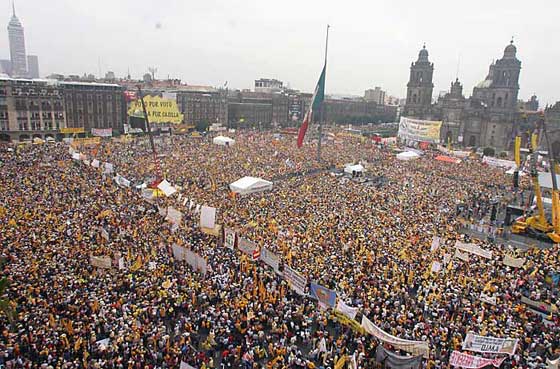
Two
million supporters of López Obrador fill the Zócalo in
Mexico City, 20 July 2006.
(Photo: Fabián García/Reforma)
López
Obrador’s political strategy is based on actions of “peaceful civil
resistance.” The huge PRD mobilizations are intended to pressure the
Federal
Election Tribunal (the Trife). However, on August 5, the
seven magistrates of the Tribunal blithely
announced the “inadmissibility of the proposal for a general recount of
the
votes.” The Trife agreed to a recount of only 11,839 ballot boxes,
amounting to
a trifling 9 percent of the voting stations set up on July 2. This
decision
marks the conclusion of any “institutional” way out: the unanimous vote
indicates that the tribunal was following orders dictated by the
government of
Vicente Fox Quesada. The directive provoked noisy protests among the
pro-AMLO
activists camped outside the Trife building. Later in the
Zócalo, during López
Obrador’s speech tens of thousands responded with a vociferous “no”
when he
asked “are we going to let ourselves” (implicitly, get screwed).
The most recent
demonstrations on behalf of López
Obrador have brought out hundreds of thousands of PRD supporters. The
Zócalo
was a sea of yellow flags (the party colors), families came from
distant
states. In general, the crowds had a plebeian character, with many
peasants and
workers, but also a lot of middle-class support for AMLO in the
capital, where
the PRD has controlled the local government for the past nine years.
Prominent
left-wing writers and intellectuals such as Elena Poniatowska, Carlos
Monsiváis
and Paco Ignacio Taibo II are out drumming up support. The independent
unions
have formed a “front for defense of the vote” to rally workers to the
PRD,
while at the National University (UNAM) a coalition for “criticial
support” to
López Obrador has been formed, in order to attract those leftist
students who
might have a “stomach ache” over supporting the candidate of the party
which
arrested 1,000 students in order to break the ten-month 1999-2000 UNAM
strike.
In the plaza, they chant, “Andrés aguanta, el pueblo se
levanta”
(Andrés, hold on, the people are rising up) and even “si no
hay solución,
habrá revolución” (if we don’t get satisfaction,
there will be a
revolution).
In this new panorama, AMLO
has opted to ratchet up the
pressure, but always within the electoral framework, and dosing it out
in dribs
and drabs, in order to “conserve forces.” Already more buses are
arriving to
reinforce the “mega plantón” (giant
sit-in) with supporters of the Coalition for the Well-Being of All
consisting
of the PRD, the Party of Labor (PT) and Convergence for Democracy (CD).
The PRD
candidate repeatedly calls on his followers to “keep calm” and reject
provocations. In fact, faced with the persistent mobilization, the
federal
government would have an interest in setting up some kind of trap, in
order to
spread fear among the middle classes and portray anti-fraud
demonstrators as a
“threat to peace.” While the authorities are betting on the
mobilization
exhausting itself, it might give a foretaste of the repression to come,
perhaps
somewhere outside the capital – AMLO’s main base of support – like in
Oaxaca,
where the combative teachers struggle continues and is spreading with
the
takeover of some 20 town halls. Currently the leadership of the Oaxacan
teachers is seeking to join its struggle with the demonstrations for
“AMLO
president.”
Much has been written
about the “campaign of fear” by
the PAN and Calderón, backed up by top business sectors, who
portrayed AMLO as
a wild-eyed radical. In fact, the PRD candidate is a run-of-the-mill
“center-left” populist politician (which earned him the disdainful
designation
of Señor López, to which his followers replied with the
obligatory references
to “Mister Fox”). AMLO uses some mildly nationalist rhetoric while
dutifully
enforcing the interests of big capital. This used to be the registered
trademark of the PRI, until it climbed aboard the “free trade”
bandwagon and
began selling off state-owned industry to its cronies at fire-sale
prices. And
as also occurred under the PRI, the “carrot” was always combined with
the
stick. During the run-up to the July election, all of the
leading
parties – the PAN, PRI and PRD alike – jointly took part in this
“strategy of
tension,” launching a series of bloody police and military assaults on
workers,
peasants.
Two strikers killed – or
more accurately, executed –
shot in the head by police sharpshooters at the Sicartsa steel mill in
Lázaro
Cárdenas, Michoacán on April 20. A 14-year-old youth and
a National University
student killed at San Salvador Atenco, near Mexico City, on May 4. And
then a
full-scale assault by an army of 3,500 state and municipal police on an
encampment of striking teachers in the capital of Oaxaca on June 14.
These
horrendous crimes show the hideous face of bourgeois “democracy.” But
just as
importantly, in each case the intended victims refused to be
intimidated,
valiantly fought back and drove out the uniformed attackers. At
Sicartsa, after
a pitched battle lasting several hours, the strikers retook the plant
while
police cruisers burned. At Atenco, peasants and townspeople, incensed
over the
arrest of flower growers (!), chased the police out of town and held
several
cops as security until their comrades were released. In Oaxaca, the
teachers grabbed
city buses to break through the metal police barriers and chase off the
repressors who had run out of ammunition.
We salute these heroic
acts of self-defense by our
class brothers and sisters, and call to generalize their response to
repression
by forming workers defense committees and preparing a national strike
against
the murderous government.
From the “Alternation”
of
Fox the Leopard,
to
Calderón the Technocrat with a “Firm Hand”
What’s at stake here with
the outcome of the elections
is not “social justice” versus “neo-liberalsim,” as claimed by many
pseudo-leftists in the AMLO camp, but rather which of the contenders
will carry
out the “structural reforms” demanded by the capitalists, both the
imperialists
and their Mexican junior partners. The victory of Vicente Fox in the
2000
elections was seen by many is the beginning of a “democratic
revolution” which
would put an end to the hated PRI regime. The reality is quite
different. There
is nothing the least bit democratic about the new regime of
“alternation.” Fox
didn’t wait long to unleash bloody repression, as he did against the altermundista (anti-globalization)
demonstrators in Cancún (see “Fox Drops the Mask,” The
Internationalist No. 11, Summer 2001) and in Guadalajara (see
“Represión in Foxilandia,” El
Internacionalista No. 5, May 2005), and today against workers and
peasants.
We are now seeing how the PAN government seeks to keep itself in power,
using
every means at its disposal, whatever the cost.
It is also noteworthy how,
after his campaign promises
about replacing the “impediment” of “costly” mechanisms of state
control, much
of the PRI’s labor apparatus is safe and sound in Fox’s regime. It
occurred to
various “progressive” intellectuals to compare this to the novel of the
Italian
writer Giuseppi di Lampedusa, Il
gatopardo (The Leopard). This novel describes how the Sicilian
governing
elite adapted to the new conditions after the unification of the
country during
the 1860s under the slogan “everything changes so that everything can
stay the
same.” But today the PAN wants to go all-out with “creative
destruction” of the
PRI edifice by introducing a government more akin to the more
“traditional”
Latin American bonapartist and semi-bonapartist regimes, the
dictatorships and
“soft” dictatorships, with an extreme free-trade policy.
The instrument selected
for this job by the business
elite is Felipe Calderón. The naming of this PAN political
operator as Fox’s
energy secretary was intended to prepare the energy “reform.” As part
of this a
whole series of co-generation plants were built to be operated under
contract
by private firms. At the same time, the government has tried to
bankrupt the
Compañía Luz y Fuerza del Centro (which provides
electricity in the central
Mexican industrial region) through financial maneuvers, charging
loss-generating prices to companies while raising prices for
individuals. It
has also set up a “parallel and private” PEMEX (Mexico’s state-owned
oil
monopoly) to out-source services and construction to oil industry
conglomerates
like Schlumberger, the Halliburton subsidiary Kellogg Brown and Root,
Bechtel
and Fluor Daniel, the same companies that have obscenely profited from
the war
and occupation of Iraq (see our article “¡Aplastar la ofensiva
privatizadora y
hambreadora – Obreros al poder!” in El
Internacionalista No. 4, May 2004). If he manages to impose his
presidency,
Calderón, the technocrat who proclaims that his hands won’t
shake when it comes
to going after “delinquents,” is already preparing his plans to carry
out such
“reforms.” And he will impose them to the letter.
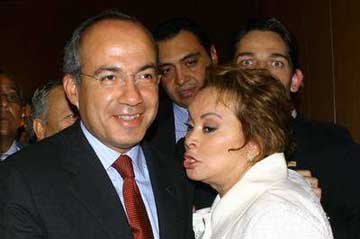 The discreet charm of
power: Felipe Calderón with Elba Esther Gordillo, head of the
corporatist teachers “union” SNTE.
Gordillo was ousted as president of the PRI and then formed her own
personal “party,” PANAL (an alternative PAN), inducing PRI governors to
proclaim Calderón the winner in 2 July 2006 elections.
The discreet charm of
power: Felipe Calderón with Elba Esther Gordillo, head of the
corporatist teachers “union” SNTE.
Gordillo was ousted as president of the PRI and then formed her own
personal “party,” PANAL (an alternative PAN), inducing PRI governors to
proclaim Calderón the winner in 2 July 2006 elections.
The PRI regime, in its
prolonged reign of seven
decades, was based on a corporatist
system of state control, in which all sectors of society were
incorporated into
the state party. This regime had its origins in the maximato2
of
Plutarco Elías Calles, when single-party rule was established.
It was later
consolidated under the presidency of General Lázaro
Cárdenas (1934-40) with the
founding of the Party of the Mexican Revolution (PRM)3
and the integration of the newly formed Mexican Workers Federation
(CTM) as the
“workers sector” of the PRM. Leon Trotsky described the nature of the
Cárdenas
government as “bonapartism sui generis”
(of a unique kind), distinct from other kinds of military-police
regimes. In
times of crisis, regimes of this sort seek to raise themselves above
the usual
give-and-take of capitalist interests and claim to represent the
broader
interests of bourgeois society. In Mexico, on the other hand – a
semi-colonial
country subject to the enormous pressure of U.S. imperialism, with a
weak
native bourgeoisie facing a combative proletariat – Trotsky indicated
that a
nationalist government would tend to tack and turn by making
concessions to the
working class, while ceding to the demands of the U.S.
Under successive PRI
presidents who followed Cárdenas,
the regime turned sharply to the right; nevertheless, at the height of
the
1970s, a repressive anti-working-class government like that of Luis
Echeverría
was capable of nationalizing industries and dishing out crumbs to
certain of
its unconditional union bureaucratic supporters. However, as a result
of the
banking crisis and the arrival of Ronald Reagan in the White House in
the ’80s,
the PRI governments of Miguel de la Madrid, Carlos Salinas de Gortari
and
Ernesto Zedillo began dismantling their own system, following the
guidelines of
“neo-liberalism.” They privatized almost all the state-owned industries
and
eliminated a whole series of social gains and concessions to workers.
They
looted pension funds of the Mexican Institute of Social Security in
order to
create the “Afores,” individual retirement accounts (similar to IRAs in
the
United States) which were then deposited in the recently privatized
banks,
enabling them to stave off bankruptcy. However, there remained the rest
of the
social security system, free public education, the state oil monopoly
PEMEX,
the state-owned electricity companies and a series of union benefits.
Fox’s PAN
government promised to give the PRI regime the coup de
grace. However, he was only able to do so half-way, leading
to considerable discontent in business circles. Calderón was put
in charge of
finishing the job.
The attempt at dismantling
the social security system
already produced an explosion of workers struggle by the workers of the
IMSS
(Mexican Institute of Social Secuirty). When a vote on the law
“reforming” the
retirement and pension system of the SNTSS (Social Security Workers
Union) by
eliminating any contribution by the employer, as well as increasing the
number
of years of service required, the workers encircled the Senate and the
august
legislators were only able to enter under police protection by the back
door.
Even so, that October the union ranks refused to approve a contract to
implement the desctruction of their pensions, which was only achieved a
year
later when SNTSS chief, Roberto Vega Galina, signed a shameful
contract. The
next day, Labor Secretary Francisco Salazar, a furious rightist who
belongs to
the fascist organization El Yunque, announced that due to this betrayal
“the
retirement and pension systems of unions throughout the country will be
modified, including those of government workers, workers in state-owned
companies and public services.”
Also still pending is the
“counterreform” to the
Federal Labor Law (LFT). Although the foundations for Mexico’s labor
legislation were laid in the famous Article 123 of the Constitution, it
was
only in 1931 under Calles that this was implemented with the
promulgation of
the LFT, which was conceived in the image of the corporatist model of
Mussolini’s Italy. The LFT establishes a government registry of trade
unions,
“regulates” the right to strike and imposes the dictates of the
all-powerful
Arbitration and Mediation Boards (JCyA). In exchange for this iron
state
control over the unions and keeping wages low, successive PRI
governments
conceded a series of benefits in order to maintain “social peace.” From
the
outset of his administration, Fox had called for an integral reordering
of the
LFT. The PAN and PRD proposed draft amendments, as did the National
Union of
Workers (UNT0, a neo-corporatist labor federation. Although they
different
substantially in various respects, all of these drafts left the bosses
with
more “flexibility” in hiring and firing workers in the name of
“modernization”
and “competitiveness.”

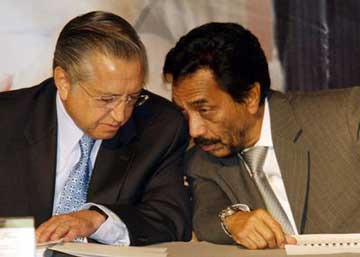
President Vicente Fox (left). Labor Secretary Francisco Salazar chats with the top charro (corporatist “union” boss) of
the Congress of Labor (CT), Víctor Flores (right). The Fox regime rested on the corporatist labor apparatus of the PRI.
(Photos: José Carlo González/La Jornada)
The PRD and UNT proposals,
although they infringed on
established rights of the workers in important respects, were promptly
rejected
by Congress. The PAN’s “Abascal Law,” named after Fox’s fascistic first
secretary of labor) initially had the support of the corporatist unions
grouped
in the CTM and the Congreso del Trabajo (Congress of Labor). This law
would
permit training and specialization contracts (like those that were
rejected by
the recent demonstrations of millions of French workers and youths),
greater
restrictions on the already greatly limited right to strike, and (taken
together with a series of decisions by the Mexican Supreme Court,
pointed
toward the complete elimination of collective contracts through the
imposing of
“individual” contracts. However, after bouncing around the various
committees
and subcommittees of Congress, where the “workers caucus” of the PRI
vacillated
over whether or not approving the initiative would lead to their own
extinction, it was declared a dead letter in April of last year. Now
the PAN
and the employers want to resume the charge. And they also want to try
their
luck with the plans for privatizing the energy sector.
AMLO
in the Service of the Multinationals
The PRD candidate’s call
to establish a “permanent
assembly” camping out in the Zócalo and in the center lanes of
La Reforma
(Mexico City’s posh main avenue) has angered conservative forces, who
are
raising a clamor for President Vicente Fox to send in the Federal
Preventive
Police to evict them. Meanwhile, the “mega
plantón” has taken on a festive air, with film and video
showings about the
repression in Atenco, chess tournaments, dance contests and brigades to
prepare
food. But this popular mobilization is on behalf of a candidate who has
declared in advance that he would pose no problems for the capitalists,
or for
the U.S. imperialists, always vigilant about what is happening just
“south of
the border.”
While many of AMLO’s
leftist backers denounce
“neo-liberalism” and “globalization” (i.e., economic policies
rather
than the capitalist-imperialist system), his prospective
economics
minister, Rogelio Ramírez de la O, announced that López
Obrador’s economic agenda
would be “social neo-liberalism”(El Universal, 2 June). When
reporters
reminded him that this had been the slogan of the hated PRI
ex-president Carlos
Salinas (who privatized with special enthusiasm much of the state-owned
enterprises), Ramírez de la O stressed that with López
Obrador, the strategy
would function because it would be carried out “without corruption.”
During his final campaign
rally in the Zócalo, on June
28, AMLO directly addressed the captains of industry and finance,
saying: We
will not act in an irresponsible way, we won’t provoke a crisis, no one
needs
to get worried…. In short, there will be a technical, not ideological,
management of the economy… there will be control of the public deficit,
the
autonomy of the Central Bank will be guaranteed and inflation will be
avoided”
(La Jornada, 29 June 2006).
When a bourgeois candidate
talks of a “technical
management” of the economy and vows to “maintain control of the
macroeconomic
variables,” what he is saying is that he will maintain the starvation
and
privatization policies dictated by the International Monetary Fund and
the
World Bank. And AMLO has already shown he would do it. As head of the
Mexico
City government, López Obrador made an alliance with Carlos
Slim, the third
richest man in the world, to “clean up” the historical city center.
Hundreds of
residents were kicked out of their homes so that the magnate could buy
up a
million and a half square meters of choice real estate. Slim
reciprocated
saying: “I will keep investing in Mexico, no matter who wins the July 2
vote,
including López Obrador.”
López Obrador also
won the support of the Shell oil
company, whose Mexico director, Cornelis van der Born, said that “the
possible
victory of a candidate of the left, like Andrés Manuel
López Obrador, would not
represent any threat whatsoever nor would it worry us. Shell works with
everyone in countries that are under governments of all colors, and
with
left-wing authorities such as Venezuela (La
Jornada, 25 March 2006).
Many opportunist leftists
who have joined in the AMLO
rallies justify their policy by claiming that U.S. imperialism is
trying to
block López Obrador from winning. There are certainly many in
the U.S.
administration who would prefer Calderón, yet even Washington
war hawk Condoleezza
Rice declared that “we are prepared to work with any president and any
government which arrives at the highest office of that country
[Mexico]” (La
Jornada, 25 April). Already a year ago, amid the politicking
dispute among
the bourgeoisie around the removal of AMLO’s immunity, Rice “ruled out
the idea
that electoral victories by governments headed by left-wing politicians
could
worry the United States,” as Reforma (10 March 2005) reported.
Not only does López
Obrador have the consent of
important capitalist and imperialist sectors, in Mexico City he carried
out the
directives of the World Bank concerning the privatization of water
resources.
The Official Gazette of the Federal District announced on 27 April 2004
that
the government was granting “concessions concerning activities relating
to the
supply of public drinking water, drainage and sewage, and where
appropriate, in
accordance with the interests of the Federal District Government, the
treatment
and reuse of residual waters” to four private companies: Servicios del
Agua
Potable S.A. de C.V. (SAPSA), Industrias del Agua de la Ciudad de
México
(IACMEX), Industrias del Agua S.A. (IASA) AND Tecnología y
Servicios del Agua
S.A. (TECSA). But where did these companies come front. Both SAPSA and
TECSA are
subsidiaries of the French water company Suez. IACMEX, for its part, is
a
subsidiary of Vivendi, another French trust; and finally IASA is part
of
Azurix, a company that is part of the Enron group!
All over Latin American
there have been popular revolts against these giant monopolies who have
sent
the price of water skyrocketing after privatizing this vital public
resource.
But not in Mexico. Why? Because it is the populist PRD which has
carried out
these policies, not a government of the right. AMLO & Co. have done
such a
good job that most Mexico City residents have no idea that the water
supply has
been privatized. As for the workers of the Federal District Water
Commission,
the concessions for the supply of water services to private companies
(with a non-unionized
workforce, of course), carrying out the same tasks as the workers who
are
members of the Union of Mexico City Workers (SUTGDF), poses an imminent
threat
of losing their jobs.
In the recent elections,
AMLO enjoyed the support of the most important “independent” unions in
the
country. The bureaucracy of the powerful Mexican Electrical Workers
Union
(SME), and of the Mexican Labor Front (FSM) which it leads, is guided
by the
policy of whatever suits the PRD candidate. Thus following the
repression in
San Salvador Atenco, the SME’s initial stance was to not mobilize
against the
repression (which it slightly modified some time later due to the
pressure of
the protests). López Obrador also has the support of the UNT and
even of some
corporatist “unions,” such as the CROC, which felt that there wasn’t
much
margin in voting for the PRI’s loser candidate Madrazo. A specially
revealing
campaign scene occurred when López Obrador appeared before
thousands of trade
unionists in a jam-packed Auditorio Nacional. Among his “friends” in
the
bureaucracy of the “independent” unions was Roberto Vega Galina, the
head of
the National Social Security Workers Union (SNTSS), responsible for
sabotaging
the struggle of the workers in defense of their pensions. When Vega
Galina
tried to speak, he was drowned out by loud whistles (booing) from the
workers.
AMLO had to approach podium to raise his arm in order to show his
support.
The Mexican bourgeoisie
subjugates those workers not regimented by the corporatist apparatus of
labor
control by means the pro-capitalist leaderships of the “independent”
unions.
Today, when tens of thousands of trade-unionists are mobilizing in
support of
López Obrador, it is more necessary than ever to fight for the
independence of
the proletariat from the bourgeoisie, its parties, its politicians and
its
state. What’s needed is not to install another, more “popular”
bourgeois
politician but to prepare workers revolution.
Form
Workers Defense Committees!
Forge a Revolutionary Workers Party!
López Obrador is
one of a series of “center-left”
bourgeois politicians who have come forward in Latin America in recent
years,
including Luis Ignacio Lula da Silva in Brazil, Lucio Gutiérrez
in Ecuador, Evo
Morales in Bolivia and Tabaré Vázquez in Uruguay. All of
these politicians have
carried out the “neo-liberal” policies of their imperialist overlords,
and
those who have been in office for a couple years have already become
the objects
of mass working-class protest and downright hatred. Gutiérrez
was run out of
Quito after repeated protests over rising fuel and electricity prices;
public
sector workers have struck against Lula in Brazil; and Morales is
facing
peasant unrest over his failure to implement his own land reform.
Everywhere,
the supposedly revolutionary left supported these capitalist
politicians (some
“critically,” others enthusiastically). The League for the Fourth
International, in contrast, has constantly warned against voting for
any
parties or candidates of a popular front, that is, of a
class-collaborationist
alliance binding the working people to sections of the bourgeoisie.
This is not the case for
the organizations of the
opportunist left – including those which call themselves communist,
whose
constant practice (never mind their Sunday speechifying with rhetorical
references to socialism) is to swim in the wake of the popular fronts,
except
when they directly join these class-collaborationist alliances. In the
mobilizations
in favor of López Obrador, one organization that has been
notable for its
prominence is the Communist Party of Mexico (Marxist-Leninist). Despite
its
pretence of equally opposing Calderón and López Obrador,
and its participation
in the Zapatista “Other Campaign,” the PCM (ML) proclaims:
“No to Fecal [Felipe Calderón]! Down with the
electoral fraud!” Calling to mobilize in the streets to “defend the
popular
will,” it joins with the López Obrador marches (Vanguardia
Proletaria,
August 2006). It thereby carries out its Stalinist popular-front policy
of
“keeping out the right.”
Even more prominent in the
mobilizations has been the
“Marxist Tendency Militante,” a fake-Trotskyist current which is part
of the
PRD, a capitalist party! The moment the polls closed and the Early
Election
Returns Program announced a 1 percent lead for Calderón,
Militante declared:
“Against Election Fraud, AMLO Must Call a General Strike” (Militante,
4
July 2006). This “general strike,” however, would only last one day.
They favorably
quoted in their article a signe declaring, “We’re ready, lord, just
give the
order!” In spite of proposing a measure which purports to be a workers
action
(a strike), they appeal to a bourgeois politician to call it, thus
removing
from it any proletarian character. Militante has been a particularly
pro-AMLO
tendency, even within the framework of the bourgeois PRD. Currently,
“following
the proposal of López Obrador,” it is promoting “Committees of
Struggle and
Information Against the Election Fraud” (Militante, August
2006). They
thereby hope to extend their influence as the best organizers of the
“anti-fraud movement.”
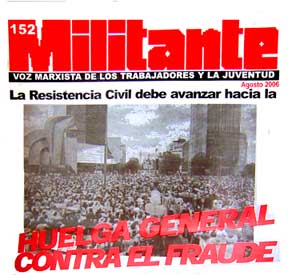 Militante:
fans of AMLO-Gandhi-Chávez Thought.
Militante:
fans of AMLO-Gandhi-Chávez Thought.
On its Internet site,
Militante puts out articles with
tags like “We Must Take the Ideas of AMLO Through to the End!”
Following the orders
of its comandante, Militante even announced a talk in the mega
plantón on
“Gandhi, non-violence and civil resistance.” These are the same
imposters who
praise Venezuelan nationalist president Hugo Chávez and claim to
be giving this
bourgeois military officer a crash course in Trotskyism. Following the
guidelines of AMLO-Gandhi-Chávez Thought, it engages in
éntrism” in bourgeois
parties from Mexico to Pakistan. Its International Marxist Tendency,
founded by
the recently deceased Ted Grant and currently led by alan Woods, wants
to be
the “left” wing of whatever “movement” is currently in vogue. More than
an
opportunist tactic, for these quick-change artists, tailism defines
their
minimum program. Their empty “militancy” goes to such ridiculous
lengths that
they criticize calls for boycotting Coca-Cola, Pepsi-Cola, Sabritas
snacks,
etc. (over their support for the PAN campaign) for violating the rules
of good
dieting. Rather than eating fried potatoes and fowl, they argue, “Keep
our
society fat- and cholesterol-free! For a general strike against the
fraud!” Even so, these champions of a
general strike
against fat and cholesterol don’t seem particularly optimistic about
the
outcome of the struggle, figuring that even if “in the end
Calderón prevails,”
they will end up with their committees against fraud.
Another outfit that calls
for a “general strike
against fraud” (in order to install a bourgeois president) is the Liga
de
Trabajadores por el Socialismo-ContraCorriente (LTS-CC –Socialist
Workers
League-Against the Current) part of the Trotksyist Faction formed by
former
followers of the late pseudo-Trotskyist Nahuel Moreno. Although they
claim it
will be the workers and not AMLO that will call this strike, the LTS’
call is
no less tailist. They refer to the hard-line policies against workers
and
popular struggles, but they lay this exclusively at the doorstep of the
PAN, ignoring
the fact that the PRD has been a co-participant in each of the recent
cases of
anti-working-class repression.
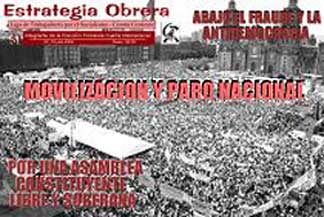 The
LTS: caboose on the AMLO bandwagon.
The
LTS: caboose on the AMLO bandwagon.
In April and May 2005,
during the big mobilizations
over the removal of López Obrador’s immunity, the LTS at first
adopted an
independent position, but it ultimately capitulated before AMLO’s
popularity.
This time around they didn’t hesitate for a minute to hitch their wagon
onto
the end of the AMLO popular front. No sooner was the word “fraud” was
uttered,
than they promptly forgot all about their weak-kneed and purely formal
opposition to the election campaign of the PRD-PT-CD coalition. In a 7
July
2006 declaration, the LTS issued a call to mobilize together with the
PRD,
spelling out the reasons for its turn. After saying they favored a
“revolutionary outcome to capitalist poverty and exploitation,” they
add:
“However, being
aware that
workers are not yet in agreement with this outcome, and faced with the
fact
that millions are denouncing the fraud. Considering that it is not
possible to
achieve genuine democracy within the bourgeois framework, we call on
them to
fight together for a Free and Sovereign Constituent Assembly.”
So the LTS
admits in so many words that it s democratizing policies inherited from
Moreno
are determined by the illusions of the masses. We might suggest, with
all due
respect, that in homage to truth, these neo-Morenoites really ought to
change
their name to LTS-With the Current.
Like el Peje (López Obrador),
the LTS “is not alone.” Last year,
the entire left joined in the mobilizations in favor of AMLO and
against the desafuero
(lifting of official immunity), with the sole exception of the Grupo
Internacionalista.
The Fox government, with the support of the PAN and the PRI in
Congress, wanted
to remove the immunity from prosecution conferred on López
Obrador in virtue of
his executive position as head of government of the Federal District.
As
proletarian revolutionaries, we oppose executive immunity, which
exempts
capitalist rulers from being put on trial for their official acts (as
opposed
to parliamentary immunity, whose purpose is to protect legislators from
government intimidation). Executive immunity is the screen which has
been used
to legalize the impunity of government assassins, such as
ex-president
Luis Echeverría, so he can evade legal action against him for
his
responsibility in the massacres of 1968 and 1971. We explained that, as
an
elementary democratic question, we opposed any attempt to prevent
López Obrador
running as a candidate. However, even though Fox’s obvious purpose was
to avoid
AMLO running for president, lifting his immunity did not have that
effect. The
mobilizations against the desafuero were demonstrations of
political
support to the PRD leader. In reality, the official registration of
candidates
did not take place until December 2005, eight months later. In the end,
the
government removed AMLO’s immunity, but that didn’t stop him from
running as a
candidate.
Another organization that falsely claims to
be Trotskyist, the Grupo
Espartaquista de México (GEM), also joined the mobilizations in
favor of AMLO
with a leaflet titled “Down with the Lifting of López Obrador’s
Immunity!” which
was distributed at demonstrations on 7 and 24 April 2005. It
subsequently
published a furious polemic against the Grupo Internacionalista for
having
refused to support these PRD mobilizations. The GEM was established at
the end
of the 1980s following the presidential campaign of Cuauhtémoc
Cárdenas and the
subsequent founding of the Party of the Democratic Revolution. In the
face of
the capitulation of the pseudo-Trotskyists before Cárdenas, for
ten years the
GEM insisted on the need to oppose the cardenista popular
front.
Nevertheless, less than a year after the expulsion of leaders and youth
cadres
of the GEM who went on to found the Grupo Internacionalista, and just
at the
moment when Cárdenas was about to be elected head of government
of the Federal
District, the GEM discovered that there is not, nor can there be, a
popular
front in Mexico. We pointed out at the time that the GEM denied the
existence
of a popular front because it didn’t want to fight it. With its support
for the
PRD demonstrations around the lifting of AMLO’s immunity, the GEM
proved us
right.
Responding to our criticism of its
capitulation before the popularity
of the bourgeois PRD, and to justify its defense of the López
Obrador’s
executive immunity, a highly anti-democratic legal precept, the
GEM
wrote that “the GI resorts to democratic abstractions” and that “this
grouplet
brags of its utter indifference to the juridical campaign against
López
Obrador” (Espartaco No. 24, Summer 2005). More recently,
however, the
GEM is whistling a different tune. In an article on the Mexican
elections, it
opines:
“The potentially
explosive, generalized discontent of the workers and the poor
population over
the rightist economic policies of the previous governments has been
effectively
channeled, for the moment, into support for the PRD and AMLO in
particular, as
was clearly shown by the enormous demonstrations against the process of
lifting
AMLO’s immunity last year, especially the April 24 march, which
mobilized 1.2
million people – the largest demonstration in the history of the
country.”
–Espartaco
No. 25,
Spring 2006
So now they recognize that the
mobilizations against the lifting of immunity were mobilizations of
political
support to López Obrador, as we pointed out at the time? And
what is their conclusion?
The logic of last year’s policy should lead GEM to join with the LTS
and the
other organizations tailing along in the wake of the “anti-fraud”
movement. In
2005, López Obrador and the PRD adroitly used Fox’s barrage to
build massive
support for their bourgeois candidacy. At that time, it was key to
fight to
uphold the independence of the proletariat with regard to all the
bourgeois
parties and politicians, as it is today. In such times, it is vital for
revolutionaries to know how to swim against the stream.
What we are seeing in Mexico today is a
popular-front campaign of
protests over electoral fraud. Generally
speaking, “anti-fraud” movements remain within the framework of
capitalist
electoral politics, such as the bourgeois “progressives” in the United
States
in the early 1900s, or the struggles against the dictatorship of
Porfirio Díaz
in Mexico at the turn of the 20th century. It’s obvious that with
slogans like
“Effective Suffrage, No to Calderón,” which was one of the most
frequently
chanted in the Zócalo on July 8, many supporters of López
Obrador are drawing a
parallel to the campaign of Francisco I. Madero against Díaz in
1910. The
leftist groups who have joined the “anti-fraud” protests may be
laboring under
the illusion that they are participating in the beginnings of a new
Mexican
Revolution.
However, it wasn’t the
Madero campaign for “Effective
Suffrage, No Reelection” (which was also Díaz’ slogan at the
beginning of his
reign) that give rise to the Revolution of 1910-17, but the resistance
of the
peasant insurgents led by Emiliano Zapata who rose up independently
against the
Porfirian repression. Later they resisted the massacres of General
Victoriano
Huerta, who acted under orders of by-then president Madero. The
pro-López
Obrtador leftists today can brag of playing the role not of
neo-Zapatistas, but
of neo-Maderistas of the first hour.
In Mexico today,
opposition to the long-lasting
PRI-government was channeled into the PRD and the PAN, bourgeois
parties of the
“left” and the right respectively. But sometimes, in periods of acute
social
tension, popular discontent boils over and leads to sharp class struggles,
not on the electoral terrain but in real battles in the streets
pointing toward
civil war. It is precisely this spectre that the Fox government is
bandying
about in order to scare the petty bourgeoisie. And it is precisely in
such
circumstances that proletarian revolutionaries intervene on the side of
the
working masses who are fighting to defend their democratic rights
against the
imposition of a government by what would be more than a “technical”
coup but a
genuine act of force of an actual coup d’état.
Recently in Haiti,
reactionary forces tried to steal a
pseudo-election held under the auspices of the United Nations, a barely
disguised
form of colonial rule, in order to keep the favorite candidate of the
slum
dwellers, René Préval, from taking office. In an article
titled “Attempted
Election Threat in Haiti” (The Internationalist No. 23,
April-May 2006),
the LFI stated:
“With open
confrontation
in the streets over the attempt by right-wing reactionaries to steal
the
election, revolutionary Marxists stand on the side of the vast mass of
poor
black Haitians against the U.N. occupation forces and Haitian police on
the
other side of the barricades, while giving no political support to
Préval and
[his mentor, former president Jean Bertrand] Aristide. We warn against
illusions in these bourgeois liberal populists.... What is
needed is a class mobilization on both sides of the
Haiti/Dominican border, to
lead the urban
and rural poor against their exploiters and oppressors. Trotskyists
would have
opposed voting for ‘Préval prezidan,’ or for any of the
capitalist candidates,
while calling today for the formation of committees of working and poor
people
to expropriate the bourgeoisie and drive out the U.N. mercenary
occupiers.”
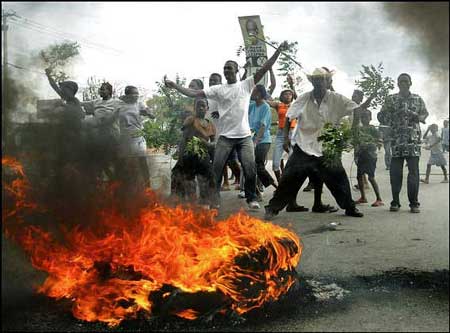 Haiti,
February 2006: anti-fraud protests go beyond the bourgeois electoral
framework. The LFI called to form workers defense committees to drive
out the U.N. and expropriate the bourgeoisie. (Photo:
Enrique Muñoz/Reuters)
Haiti,
February 2006: anti-fraud protests go beyond the bourgeois electoral
framework. The LFI called to form workers defense committees to drive
out the U.N. and expropriate the bourgeoisie. (Photo:
Enrique Muñoz/Reuters)
In Mexico today, a fight
for workers defense
committees must be directed not only against the PAN government in Los
Pinos
(the Mexican president’s residence) but also against the PRD government
of the
Federal District. Don’t forget that the newly elected governor of the
D.F. ,
Marcelo Ebrard, was the head of public security under the López
Obrador
administration. It was he who brought in the Giuliani company as
advisors to
introduce a program of “zero tolerance” to harass popular
neighborhoods,
including where there were protests over high water rates due to the
surreptitious privatization carried out by AMLO. It is quite possible
that if a
“moment of truth” should arrive when the PRD decides to call off
protests over
fraud because it threatened bourgeois “stability” and “governability,”
demonstrators will be facing Ebrard’s cops.
Today Mexico is
experiencing a situation of social
agitation, as important workers struggles coincide with a political
crisis of
the capitalist class. It is in moments like these that the construction
of the
nucleus of a proletarian vanguard, Leninist in its organization and
Trotskyist
in its program of permanent revolution becomes all the more urgent.
However,
the policy of the opportunist groups who have joined up with the
current López
Obrador electoral mobilization is counterposed from top to bottom to
Leninism
and Trotskyism. The Grupo Internacionalista, Mexican section of the
League for
the Fourth International, which is the only organization that has
resisted the
popular-front temptation to which the whole of the opportunists have
capitulated, has assumed the task of building the nucleus of this
indispensable
revolutionary leadership.
So long as the squabble is
being conducted within the
capitalist parliamentary framework, we Trotskyists refuse to give any
political
support to bourgeois forces such as the popular front around the PRD.
We call
for not votes for the “neo-liberal light,” Andrés Manuel
López Obrador, nor for
the privatizing technocrat Felipe Calderón. The aim of our
struggle is to forge
a Leninist-Trotskyist revolutionary workers party. If the conflict goes
over to
the terrain of the class struggle, revolutionaries will seek to
mobilize the
power of the working class, not to “defend the vote” but in order to
defend the
workers against a bonapartist threat. Our purpose is not to prettify
bourgeois
democracy with a new constitution or constituent assembly, but to
overthrow
capitalist rule and establish a workers and peasants government, to
begin the
socialist revolution in Mexico and the rest of the continent. n
To contact the Internationalist Group and the League for the Fourth International, send e-mail to: internationalistgroup@msn.com